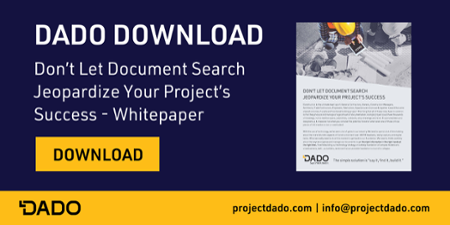Search is second nature for us when we’re on the internet. Google has reinvented the way we access information- we don’t head to the bookcase for an encyclopedia. Instead, we open the search bar and type “best pubs in London.” Or at least I do. We rely on dynamic search tools that will give us options for related searches like “People also ask: Oldest London pub” or “Most popular British beers.” We look for connections between information; search engines and tools like DADO that enable these connections allow for a more accurate search result. In this DADO post, we discuss the biggest problem with Ctrl F and how you can fix it.
Why are we still relying on CTRL F?
Using CTRL F can help us in a pinch, sure. But, it’s a narrow way to search and retrieve information. CTRL F is limited to the information you provide. If you’re looking for “gas pipe,” and you type this into the CTRL F search bar- “gas pipe” is the only result that will be returned, even if it turns out that the document you want is titled “gas piping.” We’ve heard this issue come up multiple times with our colleagues and customers in the industry, and it’s frustrating to know that just a few letters can sometimes stand between you and the result you wanted.
The same can be said for adjacent terms. If you’re looking for a plan that you think is titled “basement” but the drawing actually says “lower level” in the title block, you’re out of luck with CTRL F. Again, it’s relying on the specific search terms you’re feeding it, and it won’t make associations between terms.
We Need Algorithms to Make Connections
Search engines utilize sophisticated algorithms to categorize, rank, and discover the billions of websites that make up the internet. The search result is distilled through a complex process which evaluates large amounts of data. Distilling this information requires understanding what kind of information is available. A search engine will mine a website’s data, index and organize the information, and then rank the information based on the end user’s query.
Using a search engine to find the information we seek has become something we rely on. So, when it comes to finding the latest construction documents to perform our daily work activities, we rely on CTRL F? Isn’t that like driving the job site with tunnel vision? You will be lucky to reach your destination if you don’t know what is in your periphery. Fortunately, there is a solution. Imagine a search engine to discover the right construction documents at the right time to efficiently and effectively do your job. Sounds too good to be true? It’s not.
Enter DADO, a construction-intelligent search tool that recognizes the parallel terms/phrases that exist, like lower level and basement, or bathroom and water closet. Similar to search engines, DADO employs a sophisticated and customizable algorithm to crawl your project files, index or organize the information, and then rank the information based on your query. DADO beats CTRL F when it comes to finding hidden connections between documents, or files you didn’t know existed.
What is your experience with CTRL F? Does this function always provide the result you wanted? Have you ever missed a critical detail that was misplaced or misnamed? Share your document search experiences with us in the comments section below!
We hope you will stay tuned for The Biggest Problem with CTRL F Part 2.
CATEGORIES
- Construction Technology (23)
- Construction Document Management (14)
- Construction Document Search (13)
- DADO (8)
- Document Management Systems (8)
- Intelligent Search (6)
- Smart Forms (4)
- intelligent document search (4)
- File Search (3)
- Insider (3)
- Productivity (3)
- Search Engines (3)
- VDC (3)
- tech friction (3)
- Cost Control (2)
- Ctrl F (2)
- Customer Stories (2)
- Digital Process (2)
- Opinion (2)
- Risk Management (2)
- Smart Documents (2)
- Virtual Design and Construction (2)
- field (2)
- integrations (2)
- lean construction (2)
- safety compliance (2)
- Collaboration (1)
- DMS (1)
- IGI (1)
- OSHA (1)
- Optical Character Recognition (1)
- Project Management (1)
- Safety (1)
- TAUC (1)
- document administration (1)
- index documents (1)
- mechanical engineering (1)
- rework (1)
- voice driven (1)
Archives
- October 2020 (5)
- February 2021 (4)
- April 2021 (4)
- June 2021 (4)
- July 2021 (4)
- July 2019 (3)
- September 2020 (3)
- November 2020 (3)
- December 2020 (3)
- January 2021 (3)
- March 2021 (3)
- May 2021 (3)
- August 2021 (3)
- March 2022 (3)
- May 2022 (3)
- October 2021 (2)
- January 2022 (2)
- February 2022 (2)
- March 2020 (1)
- April 2020 (1)
- July 2020 (1)
- August 2020 (1)
- September 2021 (1)
- November 2021 (1)
- December 2021 (1)
- April 2022 (1)
- July 2022 (1)


